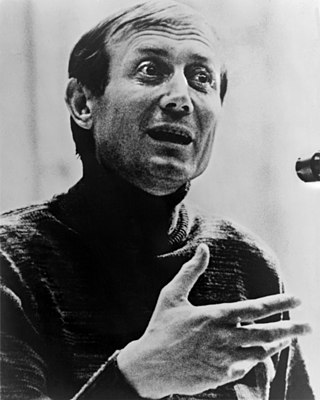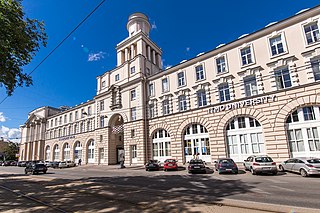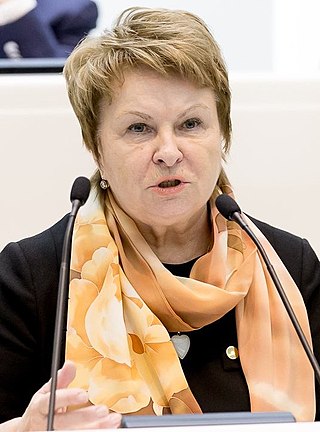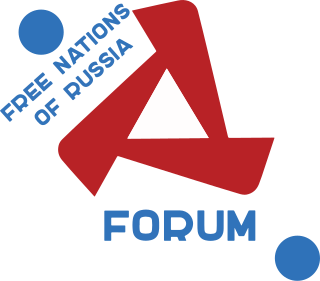
Yekaterinburg, alternatively romanized as Ekaterinburg and formerly known as Sverdlovsk, is a city and the administrative centre of Sverdlovsk Oblast and the Ural Federal District, Russia. The city is located on the Iset River between the Volga-Ural region and Siberia, with a population of roughly 1.5 million residents, up to 2.2 million residents in the urban agglomeration. Yekaterinburg is the fourth-largest city in Russia, the largest city in the Ural Federal District, and one of Russia's main cultural and industrial centres. Yekaterinburg has been dubbed the "Third capital of Russia", as it is ranked third by the size of its economy, culture, transportation and tourism.

The Republic of Karelia, also known as just Karelia, is a republic of Russia situated in Northwest Russia. The republic is a part of the Northwestern Federal District, and covers an area of 172,400 square kilometres, with a population of 533,121 residents. Its capital is Petrozavodsk.

The All-Russian Political Party "United Russia" is a conservative Russian political party. As the largest party in the Russian Federation, it holds 325 of the 450 seats in the State Duma as of 2022, having constituted the majority in the chamber since 2007. The party was formed on 1 December 2001 through a merger of Unity, Fatherland – All Russia, and the Our Home – Russia.

Yevgeny Aleksandrovich Yevtushenko was a Soviet and Russian poet. He was also a novelist, essayist, dramatist, screenwriter, publisher, actor, editor, university professor, and director of several films.

ITMO University is a state-supported university in Saint Petersburg and is one of Russia's National Research Universities. ITMO University is one of 15 Russian universities that were selected to participate in Russian Academic Excellence Project 5-100 by the government of the Russian Federation to improve their international standing among the world's research and educational centers.

The Dissenters' March was a series of Russian opposition protests that took place on December 16, 2006 in Moscow, on March 3, 2007 in Saint Petersburg, on March 24 in Nizhny Novgorod, on April 14 for the second time in Moscow, on April 15 again in Saint Petersburg, on May 18 in Samara, and on May 19 in Chelyabinsk. Some of them were featured in various media outlets.

The situation with the spread of HIV/AIDS in Russia is described by some researchers as an epidemic. The first cases of human immunodeficiency virus infection were recorded in the USSR in 1985-1987. Patient zero is officially considered to be a military interpreter who worked in Tanzania in the early 1980s and was infected by a local man during sexual contact. After 1988—1989 Elista HIV outbreak, the disease became known to the general public and the first AIDS centers were established. In 1995-1996, the virus spread among injecting drug users (IDUs) and soon expanded throughout the country. By 2006, HIV had spread beyond the vulnerable IDU group, endangering their heterosexual partners and potentially the entire population.
The Novgorod Case was the controversial criminal case against Mrs. Antonina Martynova. She was facing charges of attempted murder of her then 2-year-old daughter Alisa. The only witness was an 12 year old boy.

Starting from July 2019 numerous approved and unapproved rallies in Moscow began, caused by the situation with the 2019 Moscow City Duma elections. Widespread public protests were triggered by numerous authorities' violations, claimed by the independent opposition candidates, during the registration procedure. Rallies on Sakharov Avenue on 20 July and 10 August 2019 became the largest political rallies in Russia since the 2011–2013 protests. The July 27 rally established a record on number of detainees: 1373 people were detained. The subsequent appeals of the MCEC's decisions to the CEC by the independent candidates didn't lead to any results.

Valentina Nikolayevna Pivnenko is a Russian United Russia politician and states person. She has served in the Russian State Duma as a representative for the Karelia constituency since December 1999, firstly as an independent candidate before joining United Russia in 2000. Before that, Pivnenko was an elected member of the House of Representatives of the Legislative Assembly of the Republic of Karelia as a representative of the Prionezhsky constituency between April 1994 and February 2000. She served two terms in the Russian Federation Council as a senator for the Republic of Karelia from 1996 to 2000. Pivnenko has received many accolades during her political career.

Separatism in Russia refers to bids for secession or autonomy for certain federal subjects or areas of the Russian Federation. Historically there have been many attempts to break away from the Russian Empire and the Soviet Union but modern separatism took shape in Russia after the dissolution of the Soviet Union and the annexation of Crimea. Separatism in modern Russia was at it's biggest in the 1990s and early 2000s. The topic became relevant again after the 2022-2023 Russian invasion of Ukraine.The primary causes of separatism are nationalism in the republics, economic dependency and geographic isolation. The promotion of separatism is illegal.

On 21 September 2022, seven months into the Russian invasion of Ukraine, Russia declared a partial mobilization of military reservists. The decision was made a day after the announcement of the Russian annexation of the DPR, LPR, Kherson and Zaporizhzhia oblasts.











